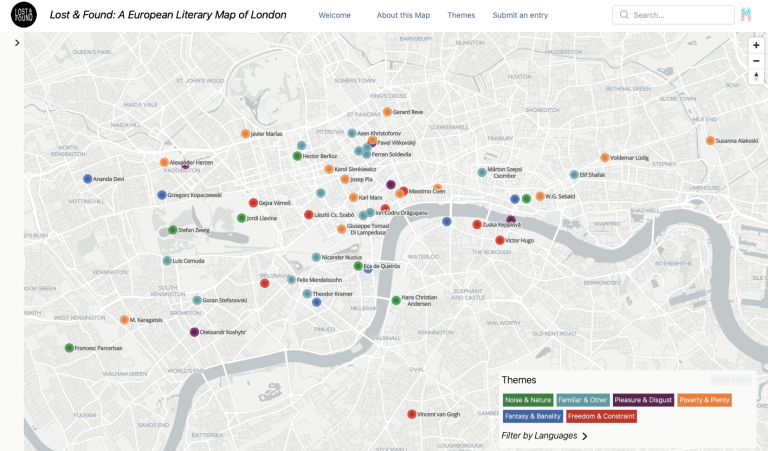European Literary Map of London
13 October 2023
Learn about the European Literary Map of London, our public exhibition 'Lost & Found' and our associated projects.

Lost & Found: Mapping European Literary London
For centuries, writers have come to London from across Europe and beyond – as honoured guests and anonymous aliens; tourists and refugees; students and wanderers.
In the squalid slums of the East End, in the glitter and glamour of Belgravia, in the unspoilt expanse of Hampstead Heath, these writers lose – and find – themselves. Their encounters with the city leave a mark: on the writer, on their work and, sometimes, on London itself.
Drawing on an interactive digital map of London developed by UCL European Institute, the Faculty of Arts and Humanities and the Bartlett Centre for Advanced Spatial Analysis, with contributions from across the UCL community, we are launching a public exhibition, Lost & Found: Mapping European Literary London.
Join us on 24 October, 5:30-7:30pm, to celebrate the opening of Lost & Found.
To register for the event, please see here.
Explore the map
The online map on which the exhibition is based is curated by the UCL European Institute and the Faculty of Arts and Humanities, using a web mapping toolkit developed by the Bartlett Centre for Advanced Spatial Analysis, and featuring contributions from the UCL community and beyond, including European National Institutes for Culture in London. Searchable by theme, location, language or keywords, the map features over 70 entries in over 20 languages – and counting. It can be explored here.
Contribute an entry
We are actively looking to expand and diversify the entries on the map, in particular by finding passages by authors from diverse or under-represented groups. See our call for contributions and submit an entry here.
School engagement and a Writer in Residency programme
By engaging local schools and launching a new Writer in Residency scheme in partnership with EUNIC London, the European Literature Network and the Delegation of the European Union to the United Kingdom, we also wish to encourage critical engagement with the texts and inspire new writing on London.
Our vision is that the Map, and associated projects, will not only be an illustration of London’s enduring relevance for European culture, but will also help to diversify how we collectively imagine and understand both London and Europe.
More information on both programmes will be available shortly here.
 Close
Close

